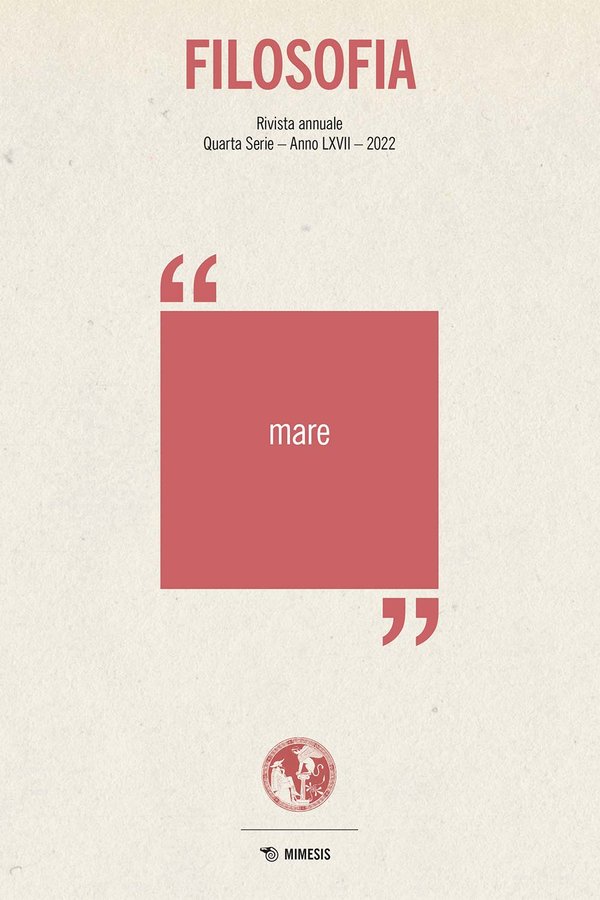Contro l’autoctonia
Il mare come metafora dell’ebraismo nel pensiero di Franz Rosenzweig
DOI:
https://doi.org/10.13135/2704-8195/7246Parole chiave:
Franz Rosenzweig, Judaism, Diasporic Thought, Nation-State, Star of RedemptionAbstract
In this essay I analyze the role of the sea from historical, symbolic and eschatological perspectives in the thought of Franz Rosenzweig, who proposed a radical philosophy of the diaspora. I consider his historic-philosophical account of the opposition between land and sea in Globus and compare it with his theological-political analysis of Judaism in the Star of Redemption. I show how his conception of an uprooted Judaism coheres with his critique of the nation-state, already developed during the war years. I spell out the metaphoric significance that the sea has in Rosenzweig’s Globus in order to illuminate the complex relationship between state and diaspora, history and eternity.
Downloads
Riferimenti bibliografici
Altmann, Alexander.1988. “Franz Rosenzweig on History” in P. Mendes-Flohr (ed.), The Philosophy of Franz Rosenzweig, 124-137. Hanover/London: Brandeis University Press.
Auerbach, Erich. “Philology and Weltliteratur”, trans. by M. Said, E. Said. The Centennial Review, 13 (1), Winter 1969: 1-17.
Balibar, Étienne. 2001. “Che cos’è una frontiera?” in id., La paura delle masse. Politica e filosofia prima e dopo Marx, 206-21. Milano-Udine: Mimesis.
Boyarin, Daniel. 2015. A Travelling Homeland. Philadelphia: University of Pennsylvania Press.
Ciglia, Francesco Paolo. 2007. “Fra eurocentrismo e globalizzazione” in Rosenzweig Franz, Globus, 141-169. Genova: Marietti.
Hegel, Georg Wilhelm Friedrich. 1967. Lezioni sulla filosofia della storia. Tr. it. Guido Calogero e Corrado Fatta. Vol. I, La razionalità della Storia. Firenze: La Nuova Italia.
Heine, Heinrich. 1860. Sämtliche Werke, Bd. 5. Philadelphia: Verlag von John Weiz & Co.
Heine, Heinrich. 1995. Lettera di Aristea a Filocrate. A cura di Francesca Calabi. Milano: BUR.
Liska, Vivian. 2020. “Jewish Exile as Experience and Metaphor After 1945”. Jewish Studies Quarterly, 27, n. 2: 146-159.
Meinecke, Friedrich. 1908. Weltbürgertum und Nationalstaat. Münich und Berlin: R. Oldenbourg.
Mendes-Flohr, Paul. 1988. “Franz Rosenzweig and the Crisis of Historicism” in id.(ed.), The Philosophy of Franz Rosenzweig, 138-161. Hanover/London: Brandeis University Press.
Mendes-Flohr, Paul. 1999. German Jews: A Dual Identity. New Haven, CT, and London: Yale University Press. Navarrete, Alonso Roberto. 2017. “Globalización y geo(teo)política de la historia: Franz
Rosenzweig y Carl Schmitt”. Éndoxa Series Filosóficas, n. 40: 183-202.
Pisano, Libera. 2017. “Silence, translation and grammatical therapy. Linguistic scepticism in Rosenzweig and Wittgenstein” in Yearbook of the Maimonides Centre for Advanced Studies, edited by Bill Rebiger, 121-143. Berlin Boston: De Gruyter.
Pollock, Benjamin. 2004. “From Nation State to World Empire: Franz Rosenzweig’s Redemptive Imperialism”. Jewish Studies Quarterly, Vol. 11, n. 4: 332-353.
Rosenzweig, Franz. 1979. Der Mensch und sein Werk. 1. Band: Briefe und Tagebücher 1900– 1918. Gesammelte Schriften, ed. Rachel Rosenzweig and Edith Rosenzweig-Scheinmann, with Bernhard Casper. The Hague: Martinus Nijhoff.
Rosenzweig, Franz. 1984. Zweistromland. Kleinere Schriften zu Glauben und Denken, ed. Reinhold Meyer and Annemarie Mayer. Dordrecht/Boston/Lancaster: Martinus Nijhoff.
Rosenzweig, Franz. 1999. “Spirito ed epoche della storia ebraica”, in id., La scrittura. Saggi dal 1914 al 1929. A cura di Gianfranco Bonola, 192-204. Roma: Città Nuova.
Rosenzweig, Franz. 2005. La stella della redenzione. A cura di Gianfranco Bonola, Milano: Vita e Pensiero.
Rosenzweig, Franz. 2007. Globus. Per una teoria storico-universale dello spazio. A cura di Francesco Paolo Ciglia, tr. it. Stefania Carretti. Genova: Marietti.
Rosenzweig, Franz. Hegel e lo stato. 1976. A cura di Remo Bodei. Bologna: il Mulino.
Schmitt, Carl. 1986. Terra e mare. A cura di Angelo Bolaffi. Milano: Giuffrè editore.
##submission.downloads##
Pubblicato
Come citare
Fascicolo
Sezione
Licenza
Filosofia applica una licenza Creative Commons Attribution 4.0 International License a tutto il materiale pubblicato.



